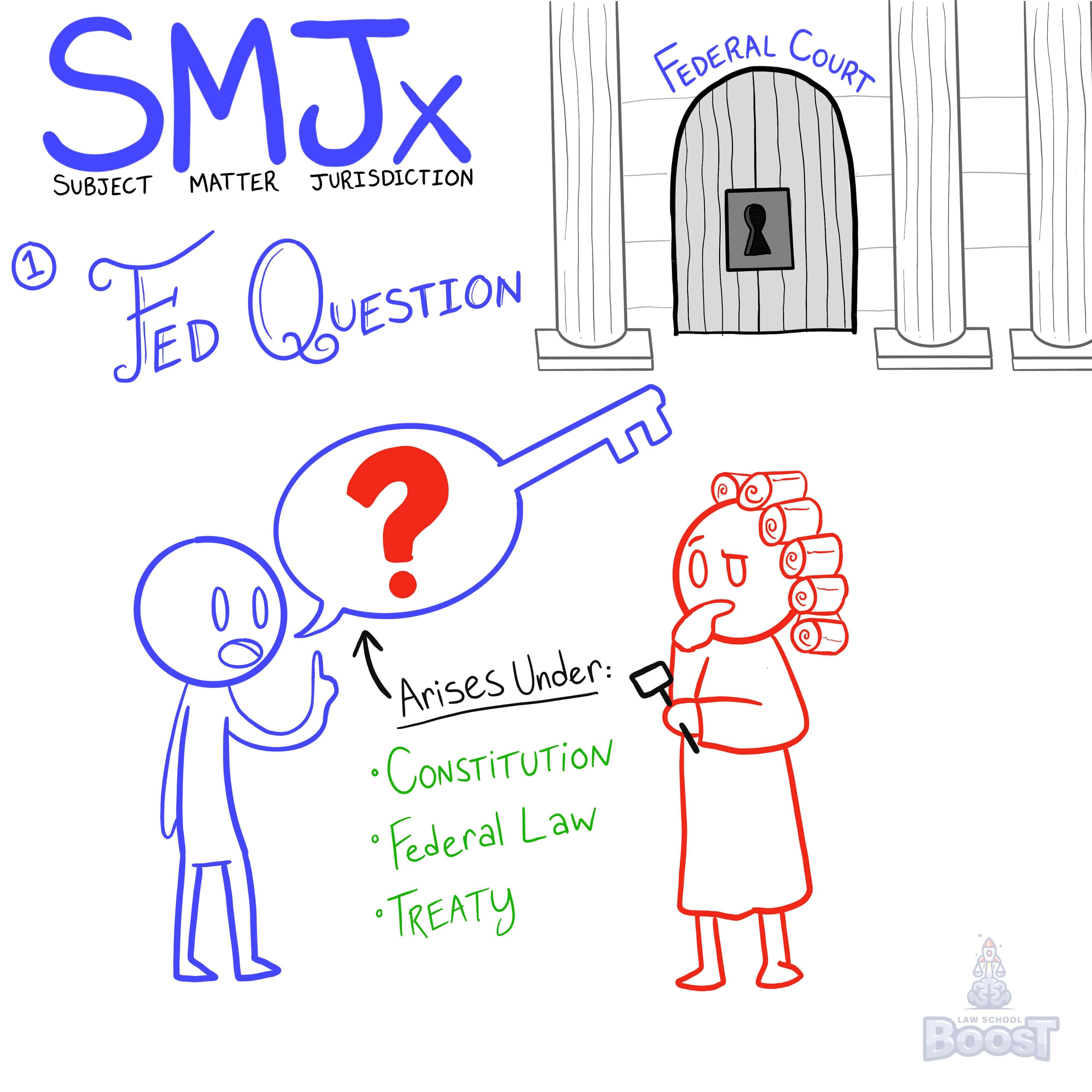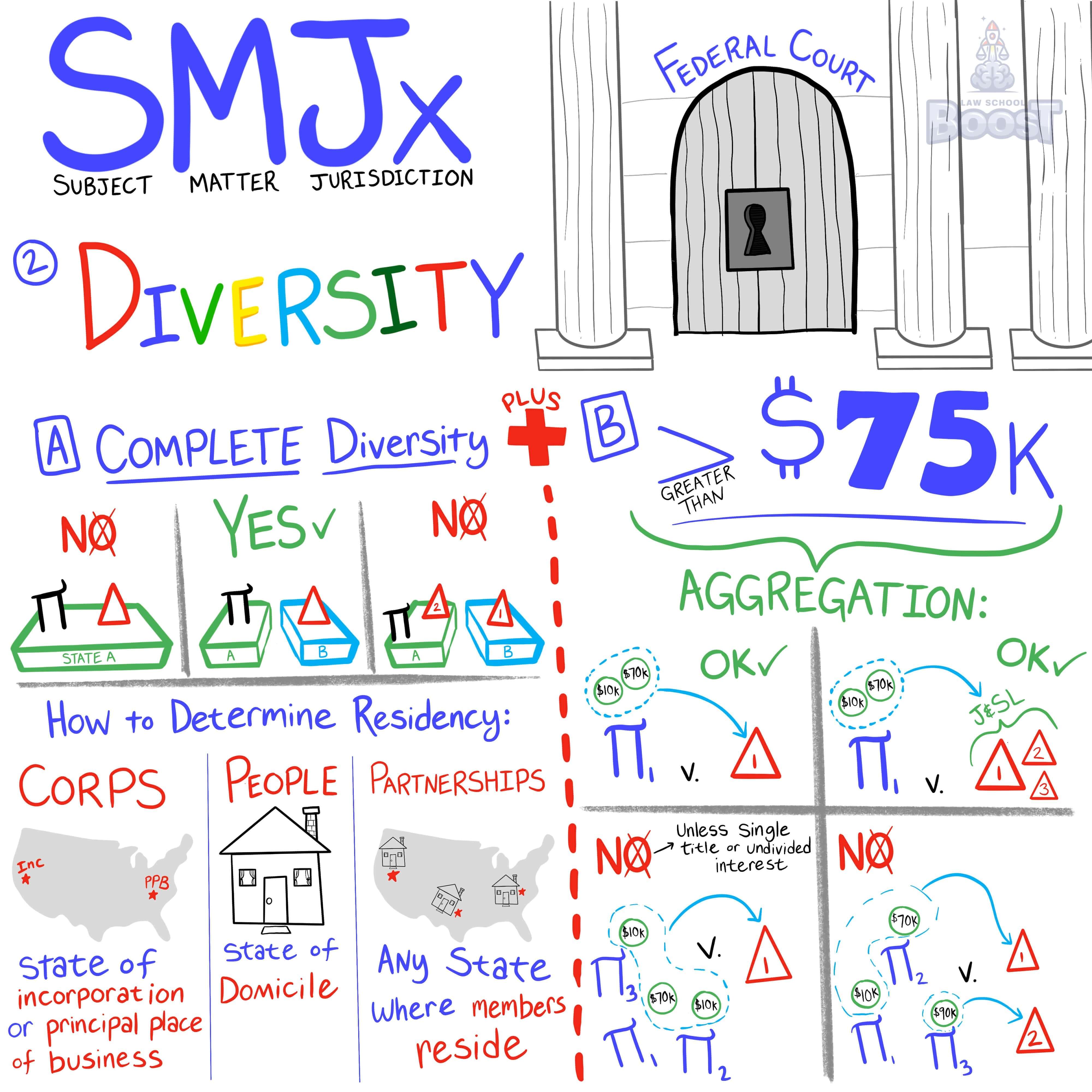🤤
Civil Procedure • Subject Matter Jurisdiction
CIVPRO#012
Legal Definition
For people, citizenship is their place of domicile.
For corporations, citizenship is both its state of incorporation and principal place of business (i.e., its nerve center).
For partnerships and limited liability companies, citizenship is any state in which its members are citizens.
For corporations, citizenship is both its state of incorporation and principal place of business (i.e., its nerve center).
For partnerships and limited liability companies, citizenship is any state in which its members are citizens.
Plain English Explanation
People are citizens based on where their place of living is.
Corporations generally have two citizenships: the first is the state where they are incorporated (e.g., "Delaware C-Corps" are corporations incorporated in the state of Delaware, which is super common); the second is its principal place of business. This one can be trickier to identify, and will require you to argue it on an exam. For example, it is common for many companies to be incorporated in Delaware even if the company has no real business dealings in Delaware. Look for where a company has most of its infrastructure, headquarters, and decision-making managers stationed and you'll usually find its "nerve center" or "principal place of business."
Partnerships and LLCs are legal entities made up of a group of individuals. As such, jurisdiction exists anywhere one of their members are citizens.
Corporations generally have two citizenships: the first is the state where they are incorporated (e.g., "Delaware C-Corps" are corporations incorporated in the state of Delaware, which is super common); the second is its principal place of business. This one can be trickier to identify, and will require you to argue it on an exam. For example, it is common for many companies to be incorporated in Delaware even if the company has no real business dealings in Delaware. Look for where a company has most of its infrastructure, headquarters, and decision-making managers stationed and you'll usually find its "nerve center" or "principal place of business."
Partnerships and LLCs are legal entities made up of a group of individuals. As such, jurisdiction exists anywhere one of their members are citizens.
Hypothetical
Hypo 1: Bob owns a house in California but spends most of the year living in a cabin located in Nevada. Result: Bob's domicile, and thus his citizenship, is likely California if he intends to return there and considers it his permanent home, despite spending most of his time in Nevada.
Hypo 2: Bob registers a corporation in Delaware, but has never visited Delaware. His company has a factory in Nevada, and his office is located in California where he and his other managers and officers control the company. Result: Bob's corporation is a citizen of Delaware, where it is incorporated, and California, where its principal place of business exists.
Hypo 3: Bob buys an RV and drives around the United States. In each state, he brings on a new partner to join his company. By the end of his trip, he has brought on 47 new partners, each living in a different state. Result: Bob's partnership is a citizen of every state where a partner resides, making it super easy for anyone to bring a lawsuit against the partnership.
Hypo 2: Bob registers a corporation in Delaware, but has never visited Delaware. His company has a factory in Nevada, and his office is located in California where he and his other managers and officers control the company. Result: Bob's corporation is a citizen of Delaware, where it is incorporated, and California, where its principal place of business exists.
Hypo 3: Bob buys an RV and drives around the United States. In each state, he brings on a new partner to join his company. By the end of his trip, he has brought on 47 new partners, each living in a different state. Result: Bob's partnership is a citizen of every state where a partner resides, making it super easy for anyone to bring a lawsuit against the partnership.
Visual Aids



Related Concepts
How can subject matter jurisdiction be based on a federal question?
How can subject matter jurisdiction be based on diversity of citizenship?
What is subject matter jurisdiction?
What is supplemental jurisdiction?
What types of cases will California courts exercise general subject matter jurisdiction over?
When is aggregation of damages under a diversity claim allowed and not allowed?
When may a federal court hear a state claim?


